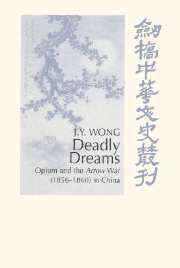Book contents
- Frontmatter
- Contents
- List of Tables
- List of Figures
- Poem by the late Mr Qin Esheng
- Foreword by Professor Wang Gungwu
- Foreword by Professor C. A. Bayly
- Preface
- Part I The confusion of imperialism
- Part II The pretext for imperialism
- Part III The personalities of imperialism
- 3 Harry Parkes: ‘If you would read a little international law.’ – Punch.
- 4 Sir John Bowring: Possessed by a monomania
- 5 Commissioner Yeh: A ‘monster’?
- 6 Rule Britannia and vox populi, vox Dei
- Part IV The rhetoric of imperialism
- Part V The mechanics of imperialism
- Part VI The economics of imperialism
- Part VII The dynamics of imperialism
- Chronology of major events
- Word list
- Abbreviations
- Bibliography
- Index
3 - Harry Parkes: ‘If you would read a little international law.’ – Punch.
Published online by Cambridge University Press: 29 September 2009
- Frontmatter
- Contents
- List of Tables
- List of Figures
- Poem by the late Mr Qin Esheng
- Foreword by Professor Wang Gungwu
- Foreword by Professor C. A. Bayly
- Preface
- Part I The confusion of imperialism
- Part II The pretext for imperialism
- Part III The personalities of imperialism
- 3 Harry Parkes: ‘If you would read a little international law.’ – Punch.
- 4 Sir John Bowring: Possessed by a monomania
- 5 Commissioner Yeh: A ‘monster’?
- 6 Rule Britannia and vox populi, vox Dei
- Part IV The rhetoric of imperialism
- Part V The mechanics of imperialism
- Part VI The economics of imperialism
- Part VII The dynamics of imperialism
- Chronology of major events
- Word list
- Abbreviations
- Bibliography
- Index
Summary
I. Introduction
Not all international incidents lead to war. The Arrow incident did, partly because of the manner in which it was handled by the men on the spot, including, first, the young acting British consul, Harry Parkes.
Born in 1828, Harry Smith Parkes was orphaned at five and sailed for China when he was only thirteen, to join his two sisters who had already settled there with their cousin, the wife of the Reverend Charles Gutzlaff. Arriving at Macao in October 1841, Parkes applied himself to the study of Chinese. He was attached to Sir Henry Pottinger's suite during the Opium War; and although only a lad of fourteen, yet because of his language skills he was often sent ashore to find forage for cattle and other provisions. He was present at the negotiations for peace at Nanjing, when he witnessed the final humiliation of the Chinese mandarins at the signing of the treaty on 29 August 1842. In September 1843 he entered the British consulate at Canton, and was again present at the signing of the supplementary treaty at the Bogue on 8 October 1843.
Apart from two brief visits home – in 1849 and 1855 – Parkes spent all his time in the East and consequently acquired ‘all the special prejudices, bogies and obsessions of any group long isolated from the culture and influence of their homeland’. He believed that ‘toughness in either words or deeds was all that was needed for success in China’.
- Type
- Chapter
- Information
- Deadly DreamsOpium and the Arrow War (1856–1860) in China, pp. 69 - 83Publisher: Cambridge University PressPrint publication year: 1998



